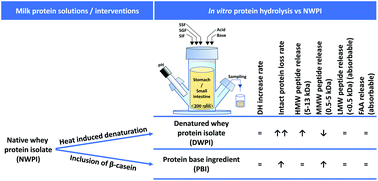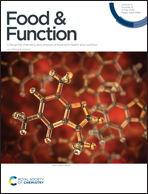Assessment of milk protein digestion kinetics: effects of denaturation by heat and protein type used†
Abstract
Knowledge about how molecular properties of proteins affect their digestion kinetics is crucial to understand protein postprandial plasma amino acid (AA) responses. Previously it was found that a native whey protein isolate (NWPI) and heat denatured whey protein isolate (DWPI) elicit comparable postprandial plasma AA peak concentrations in neonatal piglets, while a protein base ingredient for infant formula (PBI, a β-casein-native whey protein mixture) caused a 39% higher peak AA concentration than NWPI. We hypothesized that both whey protein denaturation by heat as well as changing protein composition by including β-casein, increases the rate of intact protein loss, and that changing the protein composition (by including β-casein), but not whey protein denaturation, yields a faster absorbable product release. Therefore NWPI (91% native), DWPI (91% denatured) and PBI hydrolysis was investigated in a semi-dynamic in vitro digestion model (SIM). NWPI and DWPI hydrolysis were also compared in a dynamic digestion model with dialysis (TIM-1) to exclude potential product inhibition effects that may occur in a closed vessel digestion model as SIM. In both models, the degree of hydrolysis (DH), loss of intact protein, and release of absorbable products (SIM: <0.5 kDa peptides and free AA, TIM-1: bioaccessible AA) were monitored. Additionally, in SIM, intermediate product amounts and their characteristics were determined. DWPI showed considerably faster intact protein loss, but similar DH and absorbable product release kinetics compared with NWPI in both models. Furthermore, more, relatively large, intermediate products were released from DWPI than from NWPI. PBI showed increased intact protein loss, similar DH, and absorbable product release kinetics, but more, relatively small, intermediate products than NWPI. In conclusion, both whey protein denaturation and β-casein inclusion increased the rate of intact protein loss without affecting absorbable product release during in vitro digestion. Our results suggest that intermediate digestion product characteristics are important in relation to postprandial AA responses.



 Please wait while we load your content...
Please wait while we load your content...